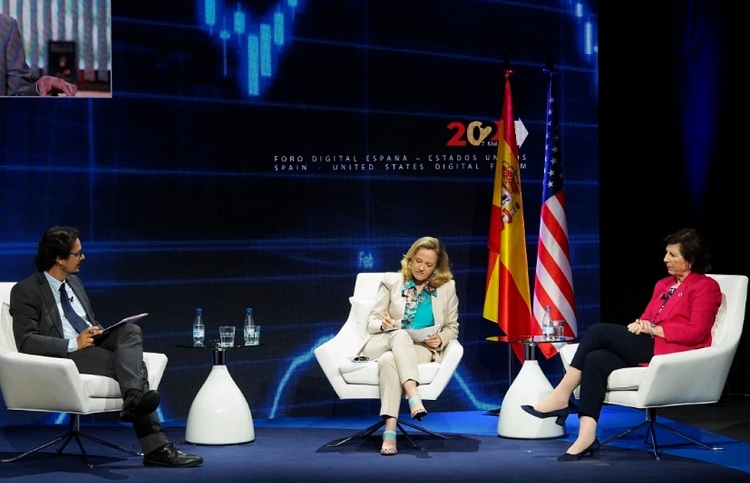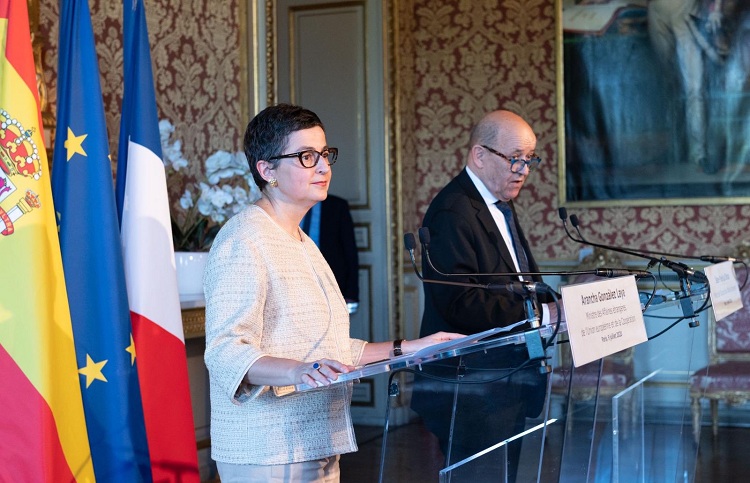The Diplomat
The 25th Spain-United States Forum on Wednesday underlined the importance of multilateralism in the aftermath of the pandemic to meet the needs of the nations most in need.
On its first day, the Forum opened with speeches by Juan Lladó, President of the Spain-Spain-United States Council Foundation, and Senator Joaquín Castro, Honorary President of the United States-Spain Council, the organisations behind the event, as well as Santiago Cabanas, Spanish Ambassador to the United States, and Conrad Tribble, Chargé d’Affaires at the US Embassy in Madrid.
The first working session was attended in person from Madrid by Nadia Calviño, Second Vice President and Minister of Economic Affairs and Digital Transformation, and Helena Herrero, President of HP Southern Europe. Xavier Becerra, Secretary of the US Department of Health and Human Services; Joaquín Duato, Vice Chairman of the Executive Committee of Johnson & Johnson; and Loyce Pace, Director of the Office of Global Affairs of the US Department of Health and Human Services, spoke remotely from the United States.
The debate focused on the theme of “The Post-COVID-19 Economy: Towards a More Resilient, Inclusive and Sustainable Recovery”, and highlighted that the severe economic impact of COVID globally has resulted in significant job losses, social disruption and increased inequalities over the past year, comparable only to wartime situations.
It was also noted that in Spain and the United States, the crisis has also particularly affected the service sector and tourism, and has caused a situation that has led the governments of both countries to adopt policies focused on monetary easing and fiscal expansion.
It was also highlighted that, in the belief that vaccine administration is the best health and economic policy, both Spain and the United States have invested massively in vaccination campaigns, albeit with varying results. Now that both countries are approaching a 70% vaccination rate, new long-term strategies have been set, using the crisis as an opportunity to transform the economy.
economy.
Hence, it was recalled, the recovery programmes promoted by the United States (Building Back Better), Spain and the EU (Next Generation EU) have emphasised investments in decarbonisation and digitalisation programmes. In any case, attention was drawn to the risk that those left behind by the crisis may not be brought back, with the consequent widening of the social gap and inequality that already existed before the pandemic.
Therefore, the speakers agreed on the importance of multilateralism in order, through joint collaboration, to meet the needs of the nations most in need. Multilateralism in which health and economics must go hand in hand, they said.
Likewise, the participants recognised that the COVID-19 crisis has served to make us aware of the fragility of the public health, social security and strategic autonomy systems of both countries, from which derives the need to continue working to promote and improve them.
Furthermore, the different speakers highlighted the urgent task of the governments of Spain and the United States and of companies to ensure that digitalisation does not deepen social inequalities, as well as the role of corporate sustainability in building companies with purpose that are committed to the talent of people and their skills.
After a space dedicated to the participants in the “Young American Leaders” programme, organised annually by the Spain-United States Council Foundation and the United States-Spain Council since 2001, the first day of the Forum concluded with a speech by Arancha González Laya, Minister of Foreign Affairs, who addressed what she considered to be the four challenges of economic and social recovery: democracy, decarbonisation, digitalisation and the reduction of inequalities.
Democracy,” he said, “is suffering from growing institutional fragility and a clear lack of popular support, with a political debate that divides, with networks and media that contribute to amplifying social differences. The scenes on Capitol Hill earlier this year remind us that we need to invest firmly in its solidification.







